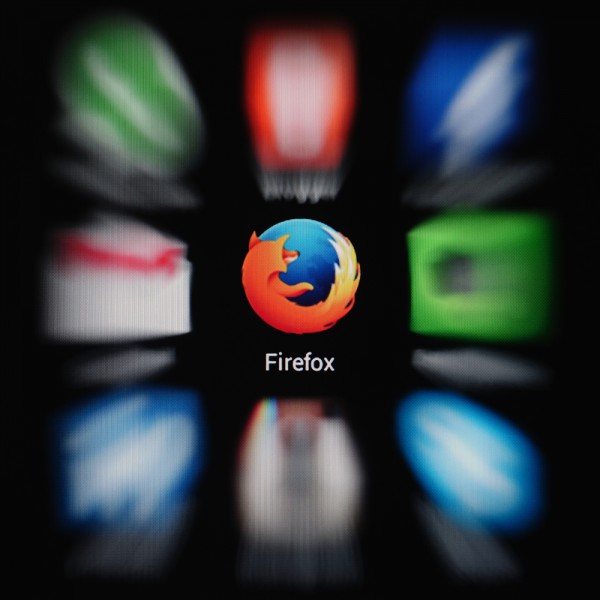
Mozilla's Metro move shows that modern apps belong in the mortuary
Just a few days ago, Mozilla announced that it would not bother releasing a modern version of Firefox for Windows 8.x -- this in spite of the fact that a team of developers have been working on it for over a year. It seems that the company behind the famous foxy browser regards the modern interface with just about as much disdain as everyone else. So much contempt, in fact, that it can't even bring itself to use the proper terminology: "I know [Metro is] not what Microsoft calls it anymore, but it remains how we talk about it in Mozilla", sneers Johnathan Nightingale, Vice President of Firefox.
Despite acknowledging that Mozilla is no longer "tiny" (far from it, really), Nightingale says that the company needs to focus its attention on those projects that will have the most impact. According to StatCounter, Firefox still manages to grab over 20 percent of the desktop browser market, dropping very slightly to just over 19 percent once tablets are factored in. But moving forward, there will simply be no more work carried out on the modern version of the browser. It is being abandoned like the runt of a litter.

Mozilla disses Microsoft -- cancels Modern UI version of Firefox for Windows 8.x
The hatred of Modern UI and its associated Start Screen is well documented. Many users dislike the full-screen Windows apps, stating they are less productive with them. There can be truth to that -- working with multiple open programs and apps simultaneously can be problematic. Not to mention, there are very few apps compared to legacy programs. Some users may feel that if they cannot go "all in" on Modern UI, they don't want to use it at all.
It is hard to blame developers for not embracing Modern UI -- Microsoft hasn't even done so with Office. One notable app that has been conspicuously absent, is Firefox. Mozilla developers have been working on it, but a final, stable version never came to fruition. Sadly, Mozilla announces that it is cancelling the project, dealing Microsoft's Windows 8.x a significant blow.

Mozilla and Epic show-off Unreal Engine 4 running in Firefox
As the world trends toward Google's Chrome, it is easy to forget about trusty old Firefox. After all, Google's browser has more features and is arguably faster. However, while Google Chrome is based on the open-source Chromium project, it is not fully open-source. Conversely, Firefox remains open and well maintained. It is reliable and trustworthy.
However, Firefox shouldn't just be relegated to the role of stagnation -- quite the contrary. Mozilla is still pushing along and improving the speed and experience. To drive that message home, today it is revealed that the Unreal Engine 4 is running in Firefox without plugins. Wow.

New raft of partners to help push Firefox OS in 2014
Firefox OS may have been with us since last year, but it's yet to make any sort of headway into the market. At CES, a new batch of partners has been unveiled which it is hoped will propel Firefox OS to mass popularity. Just as Android is not limited to use in phones and tablets, so Firefox OS has applications in other areas, and this is something demonstrated by the latest partnership with Panasonic. Working with Mozilla, the company will produce Firefox OS-powered smart TVs.
But of course there is great scope for Firefox OS to be used as a mobile platform, and this has already been explored to some extent. ZTE has produced a phone running Mozilla's operating system and in the coming year the company will be developing a "new Firefox OS line to give users more choice". But the success of an operating system is not just about getting customers on board -- developers are also vital.

Mozilla partners with mobile companies to promote open web compliance
It’s often said that the great thing about standards in the technology industry is that there are so many to choose from. That's just as true in today's world of mobile devices as it was in the days of mainframes when it was first coined.
Mozilla, LG, Qualcomm, Deutsche Telekom and a number of other leading mobile companies have taken a step closer to a world where standards are... well, standard, by joining forces to create the Open Web Device Compliance Review Board (CRB). The aim of the CRB is to support device manufacturers and their technology partners to standardize performance.

Happy birthday Firefox -- nine years old today!
November 9, 2004. The date may not mean much to you, but it was rather big in the land of Mozilla. It wasn't the 'start' of the Firefox web browser, but it was the official ship date of version 1.0. That makes today a birthday celebration for the browser that dared to take on the Internet Explorer-giant.
"In the nine years since we first launched Firefox, we have moved and shaped the Web into the most valuable public resource of our time", the organization announces.

Mozilla releases Firefox 26 Beta 1 and Firefox Aurora 27.0a2, concentrates on behind-the-scenes tweaks
Mozilla has followed on from the recent release of Firefox 25.0 FINAL with the update of its two pre-release channels to Firefox 26.0 Beta 1 and Firefox Aurora 27.0a2 respectively.
Like version 25, version 26 has little in the way of visible new features other than that all plug-ins now default to "click to play" mode. Version 27 has no brand new features either, although some features -- notably optimized Windows 8 support -- remain exclusive to this build.

LG releases Fireweb, its first Firefox OS smartphone
Even though LG is the second-largest Android smartphone vendor and showing strong growth in the market, the South Korean manufacturer does not want to put all its eggs in one basket. The company is now also pursuing success with Firefox OS, with its new Fireweb smartphone.
The smartphone launches today in Brazil, alongside the Alcatel Onetouch Fire, at local mobile operator Telefonica Vivo. Like other Firefox OS devices, the Fireweb is aimed at the low-end smartphone market, featuring modest hardware by modern standards.

Mozilla's Firefox OS to reach more markets and devices
Even though Mozilla may be among the latest entrants in the smartphone market, it has a real chance to succeed in its quest to turn Firefox OS from yet another new kid on the block into a major player. The mobile operating system is available on inexpensive devices, is backed by a couple of large mobile operators and will reach a significant number of prospective buyers in emerging markets.
Today, Mozilla announces it is gearing up for the second round of Firefox OS launches, which are set to reach more markets and more devices. The latest expansion will kick off "soon", with mobile operators Deutsche Telekom, Telefónica and Telenor revealing their short-term plans for expanding the Firefox OS market availability.

Google Chrome to ban the Netscape Plug-in API -- in 2014
Back in the 90s, while everyone was watching Melrose Place and listening to Pearl Jam, internet usage was exploding. At the time, the Netscape Navigator browser was all the rage -- it was the most popular way to access the web. One of the most innovative features of Netscape was the introduction of plugins. You see, this ushered in the era of web-based multimedia. For example, while it is almost extinct now, the Realplayer plugin was mind blowing -- you could stream video in a web browser; amazing at the time. This was all thanks to the Netscape Plug-in API (NPAPI).
Of course, all things must end, and Netscape Navigator is just a memory; a no longer developed piece of software. However, despite that particular web browser's demise, the NPAPI lives on. Unfortunately for NPAPI, Google Chrome and the Chromium project have just put it on death row -- lethal injection in 2014.

Firefox 23 enables mixed content blocking, consolidates search settings
Mozilla has released Firefox 23.0 FINAL, the latest version of its open-source, cross-platform browser for Windows, Mac and Linux. The new build’s main highlight is the implementation of mixed-content blocking for improved security, but it also comes with a host of minor changes, including one that has already provoked a negative response from power users.
The controversial change is the consolidation of search default preferences so both Address bar and Search bar use the same default search engine. Previously Address bar searches defaulted to Google regardless of the default provider set in the Search bar.

Mozilla: Browsers could share your interests with websites
Your web browser records everything you do on the web. It knows where you go, it knows where you’ve been, what your favorite websites are, and it likely even knows your passwords. But fortunately it doesn’t share that information with the world. At least not yet.
Mozilla, the non-profit behind Firefox, is proposing to change that. The organization wants your browser to be able to tell websites the sort of things you’re into, allowing those sites to serve up personalized content tailored just for you.

Deutsche Telekom brings Firefox OS to Europe, starts in Poland
Mozilla is now set to reach a wider audience with its up-and-coming Firefox mobile operating system. We had previously heard the first handsets would be coming to Deutsche Telekom soon, but a press conference has yielded more details about what potential customers can expect.
During an announcement in Warsaw, Poland the carrier says that "sales of the Alcatel One Touch Fire powered by Firefox OS will start soon in Europe. T-Mobile Poland will offer the Firefox OS-powered smartphone via its online sales channels from tomorrow on and from July 15 nationwide in 850 shops".

Can new Firefox OS smartphones conquer low-end market?
On Monday, Mozilla announced that the first Firefox OS smartphones will arrive "soon". The initial devices that run the new operating system, the Alcatel One Touch Fire and ZTE Open, are set to be released by mobile operators Deutsche Telekom and Telefonica in a number of regional markets.
"The launch of Firefox OS marks an incredibly exciting time for the Web. Firefox OS powers the first smartphones built entirely on Web technologies and will stimulate an inspiring new wave of innovation for the Web", says Mozilla COO Jay Sullivan. "We are proud to deliver an experience for first time smartphone users that will delight them and really put the power of the Web in people's hands".

Firefox 23 Beta arrives, enables mixed content blocking, click-to-start plugins
Hot on the heels of the release of Firefox 22.0 FINAL, Mozilla has released Firefox 23.0 Beta 1, a preview version of the next release that will ship in around six week’s time.
Version 23.0 implements mixed-content blocking for greater security, plus allows plugins to be evoked only when specific websites require them. New consolidated search default preferences have also been implemented that could prove controversial.
